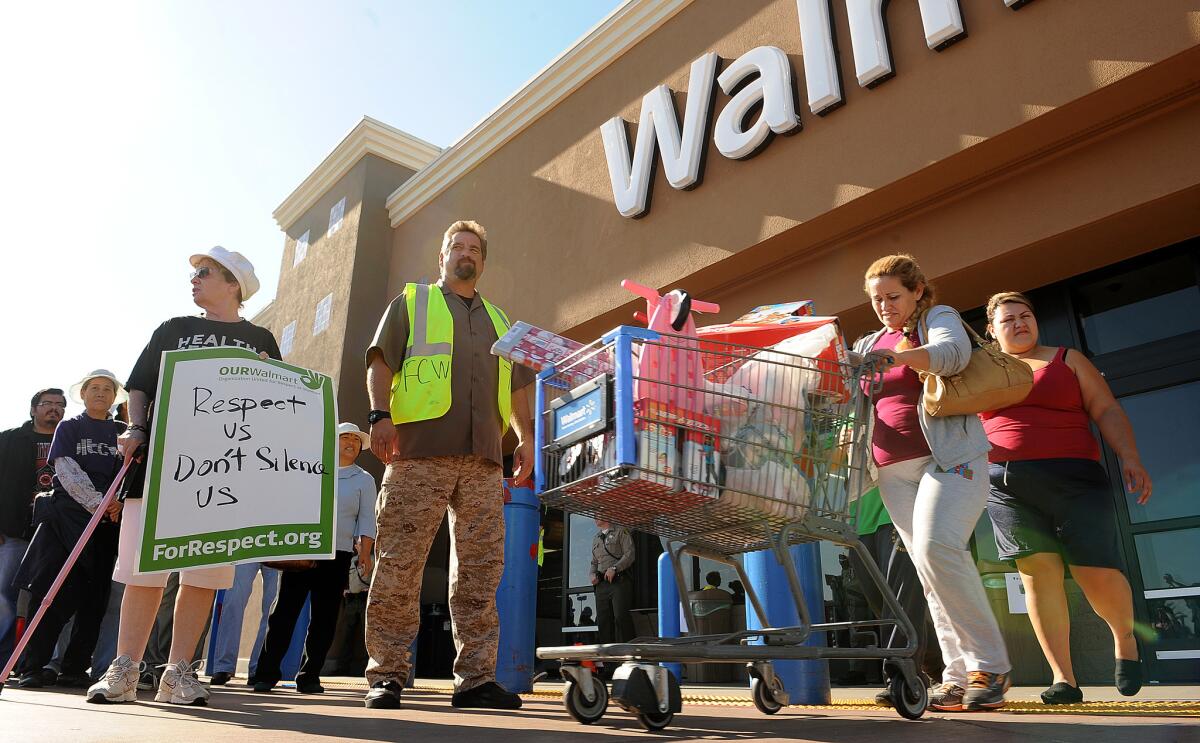Retail pay hikes: What you need to know

- Share via
Wal-Mart Stores Inc. announced last week that it was raising the minimum hourly pay for its workers to $9 an hour in April, and to $10 an hour in 2016 for those who are currently employed by the company. The world's largest retailer was facing pressure from labor activists who were pushing for higher wages, but it is just one of several companies that have recently moved to boost pay for its employees.
Which retailers have increased pay?
Gap Inc., the parent company of Gap, Old Navy and Banana Republic, raised its minimum hourly rate for U.S. workers to $9 last year, and then to $10 in 2015. The San Francisco retailer said the pay hike will raise the wages of 65,000 of its 90,000 U.S. employees.
Then last week, Wal-Mart announced a wage boost along with major changes to the company’s training, scheduling and compensation policies.
On Wednesday, TJX Cos., the parent company of discounters T.J. Maxx and Marshalls, also said it was boosting the minimum hourly pay to $9 in June. Those who have worked at least six months will get an additional bump to $10 an hour in 2016.
Why are they doing it?
The pay raises come as the nationwide fight for higher minimum wage laws has gained steam. Some companies such as Wal-Mart and McDonald's have been the target of rallies and demonstrations by workers and labor organizers who demand a minimum hourly wage of $15 and more dependable hours.
Some observers say that retailers are also preemptively boosting pay to head off efforts by lawmakers to pass federal legislation mandating a higher minimum wage. Many companies are also raising pay in order to hold on to employees who increasingly have more options in the job market as the economy improves.
What's happening with minimum wage laws?
Congressional action to raise that base has been stalled for years. The wage hasn't increased since 2009, and now, 29 states and the District of Columbia have minimum wages above the federal standard, and seven of them are at $9 or higher.
In June, Seattle leaders voted to increase the city's minimum wage to $15 an hour, the highest minimum of any metropolis in the country. The Los Angeles Unified School District signed a contract in July to raise its minimum wage to $15 an hour by 2016, which will boost the earnings of its lowest-paid employees, including custodians and cafeteria workers.
Los Angeles Mayor Eric Garcetti is pushing for a $13.25 minimum wage for all workers in L.A. by 2017. California's current minimum wage is $9 an hour.
What does this mean for consumers?
That depends on the company. Giant corporations such as Wal-Mart can swallow some costs and save money by slashing their training and recruiting expenses. Smaller retailers who move to hike pay may be forced to pass expenses onto consumers.
For more need-to-know news, follow @ByShanLiInside the business of entertainment
The Wide Shot brings you news, analysis and insights on everything from streaming wars to production — and what it all means for the future.
You may occasionally receive promotional content from the Los Angeles Times.








